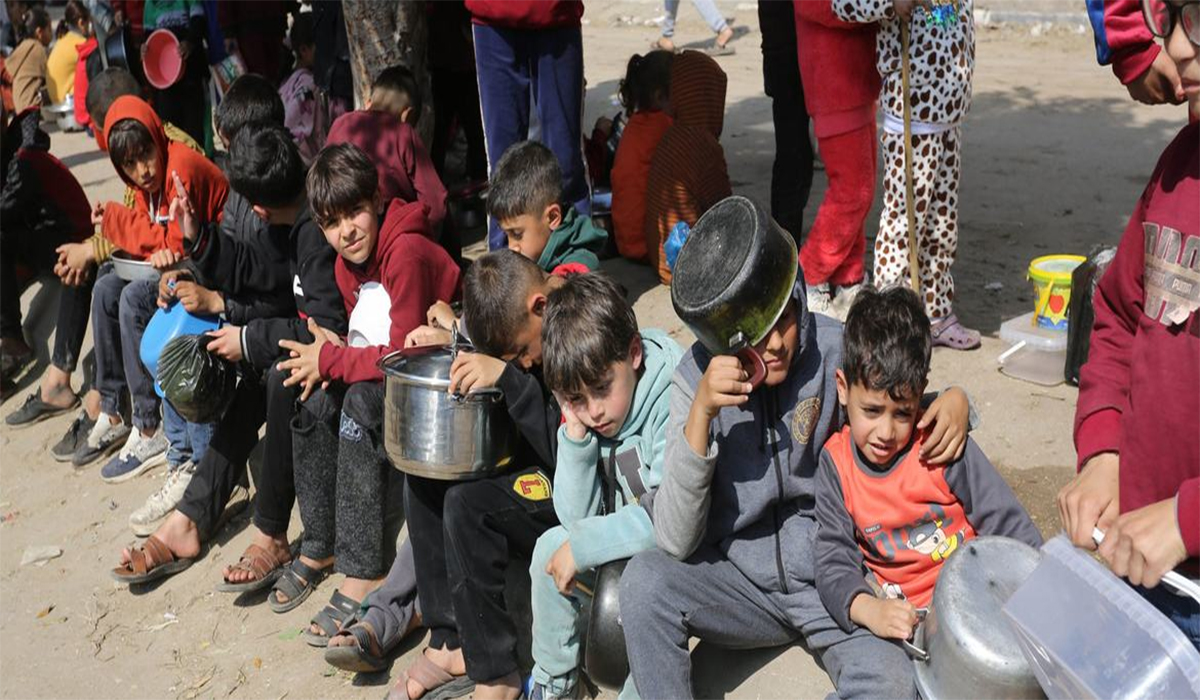
As the humanitarian crisis in Gaza spirals into an even darker chapter, a chilling warning from the United Nations has drawn international attention: 14,000 babies could die within the next 48 hours unless life-saving aid is allowed in. The warning, issued by UN humanitarian chief Tom Fletcher, paints a harrowing picture of the devastation unfolding in the besieged enclave as basic necessities like food and medicine remain out of reach. Fletcher, speaking to the BBC this week, did not mince words. “There are 14,000 babies that will die in the next 48 hours unless we can reach them,” he said. “We’re running all sorts of risks just to get baby food to mothers who can’t feed their children because they’re severely malnourished.” The numbers are staggering.
According to the UN-backed Integrated Food Security Phase Classification (IPC), more than 93% of Gaza’s children—about 930,000—are now at risk of famine. The humanitarian fallout comes in the wake of an almost total blockade of aid since March 2, with Israel halting the entry of essential supplies like food, water, and medicine. On Monday, May 19, for the first time in over two months, Israel permitted a limited number of trucks to cross into Gaza—just five vehicles in total. But those trucks, as Fletcher pointed out, did not reach those in need. “They’re just sitting on the other side of the border. They haven’t made it to the communities where babies are starving,” he added, calling the move a “drop in the ocean.”
The Gaza Strip, already reeling from months of war following the October 7 Hamas attack and the subsequent Israeli military campaign, is now descending into what humanitarian experts describe as faminelike conditions. The blockade, imposed by the Netanyahu-led Israeli government, has intensified a humanitarian catastrophe that has been building for over a year. According to UN officials, Gaza needs at least 500 trucks of aid per day to meet basic requirements. The sudden halt to aid in early March triggered a complete collapse of food supply chains, with skyrocketing prices and widespread hunger. Earlier in the year, the World Food Programme had already estimated that 14,000 children in Gaza were suffering from severe acute malnutrition.
That number now appears to be the baseline for potential deaths if aid does not reach them immediately. P a l e s t i n i a n f a m i l i e s , trapped under blockade and bombardment, report unimaginable conditions. One local journalist described children drawing food in the sand to distract themselves from hunger. “Starvation,” many say, “has become worse than the bombings.” Fletcher’s warning has also sparked criticism within Israel itself. Yair Golan, a former deputy chief of staff of the Israeli army and a prominent opposition figure, lashed out at the Netanyahu government, accusing it of dragging the country towards moral ruin. “A sane country does not wage war against civilians, does not kill babies as a pastime, and does not engage in mass displacement,” Golan told a local radio station. Drawing from Jewish history, Golan added, “We, a people who have endured persecution, pogroms, and genocide, are now engaging in actions that are utterly unconscionable.” The international reaction to the crisis has been slow, but mounting.
Following the May 19 announcement that limited aid would be allowed in, the UK, France, and Canada issued a rare joint statement condemning Israel’s humanitarian restrictions as “wholly inadequate.” The countries warned of “concrete actions” if the situation did not improve, urging Israel to open crossings and allow for meaningful humanitarian access. On May 20, Israel reportedly agreed to allow 100 aid trucks to enter Gaza daily. However, according to UN spokesperson Stephane Dujarric, no aid had reached the population by Tuesday. While supplies have been dropped off near the Karem Abu Salem (Kerem Shalom) crossing, they remain undistributed due to continued delays and red tape. UNRWA’s Director of Health, Akihiro Seita, also expressed alarm, warning that the health crisis was worsening “exponentially” and may soon move beyond the point of control. In a sign of growing political consequences, the UK government has begun to take tangible steps in response to the situation. Talks on a trade agreement with Israel have been suspended, and the Israeli ambassador has been summoned. The UK has also imposed fresh sanctions on Israeli settlers accused of human rights abuses in the West Bank. In the House of Commons, British Foreign Secretary David Lammy denounced the Israeli offensive in Gaza as “morally unjustifiable,” adding that the conflict was “entering a dark new phase.”
Prime Minister Keir Starmer echoed these concerns, calling the current situation in Gaza “intolerable.” He urged the Israeli government to allow humanitarian aid “in at pace,” before irreversible damage is done. As the clock ticks down for thousands of babies in Gaza, the sense of urgency grows sharper. The world is watching—but action remains insufficient. Aid, though technically allowed in limited quantities, continues to sit idle at border crossings, while inside Gaza, families wait helplessly with starving children in their arms. The question now is not just about logistics, but morality. As international outrage mounts, so too does the pressure on Israel to lift restrictions and allow unrestricted humanitarian access. Until then, the risk of a mass child mortality event looms large—and the weight of that tragedy will not be easily forgotten
